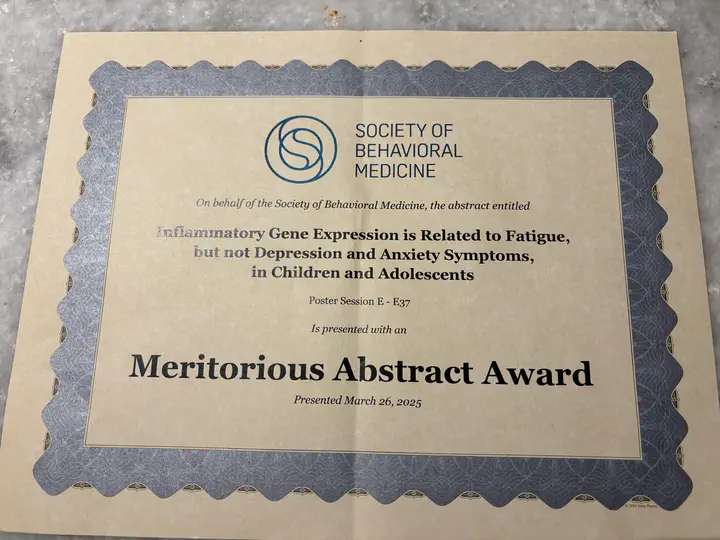Inflammatory Gene Expression is Related to Fatigue, but not Depression and Anxiety Symptoms, in Children and Adolescents

Event: Society For Behavioral Medicine 2025 Annual Meeting
Location: San Francisco, CA, USA
Authors: Francesca R. Querdasi, Julienne E. Bower, Steve Cole, Naomi N. Gancz, Kristen A. Chu, Emily Towner, Eason Taylor, Bridget L. Callaghan
Poster Abstract:
Fatigue is a common, but underappreciated, complaint among children and adolescents that can disrupt daily functioning. Understanding the biological underpinnings of fatigue during development is needed to inform treatments appropriate for this age group. While inflammation plays a causal role in fatigue during adulthood, little research has examined this relationship during development. As circulating inflammatory markers are typically low in childhood, measuring inflammatory gene expression can reveal more upstream and earlier-emerging aspects of inflammatory biology.
In this study, we examined concurrent associations between inflammatory gene expression and fatigue symptoms in a sample of N=65 children and adolescents (mean age = 12.77, range = 7-17 years) with varied exposure to caregiving-related early life adversity (crEA): N=26 with significant exposure (maltreatment and/or extended parental separation) and N=39 without history of maltreatment or parental separation. To assess the specificity of associations between inflammatory gene expression and fatigue versus general ill-health, we also tested associations with internalizing (i.e., anxiety and depression) symptoms. Children provided dried blood spot samples for analysis of RNA transcripts from an a priori specified set of 19 pro-inflammatory genes, and children and caregivers completed questionnaires on children’s fatigue and internalizing symptoms. Multilevel linear modeling, treating expression values within each gene as a repeated measure of inflammatory gene expression, was used for analysis.
We found that higher inflammatory gene expression was associated with more self-reported fatigue symptoms. We also found an age-by-inflammatory gene expression interaction on caregiver proxy-reported fatigue symptoms, such that there was a positive relationship between inflammatory gene expression and fatigue for children in the sample older than 14.74 years. Inflammatory gene expression was not significantly related to internalizing symptoms. CrEA did not predict inflammatory gene expression; controlling for crEA, inflammatory gene expression remained significantly related to fatigue symptoms. Findings suggest inflammatory processes may be uniquely related to fatigue symptoms in childhood and adolescence. Pending replication and further research that assesses causality, they also point towards new directions for fatigue treatments during childhood development.